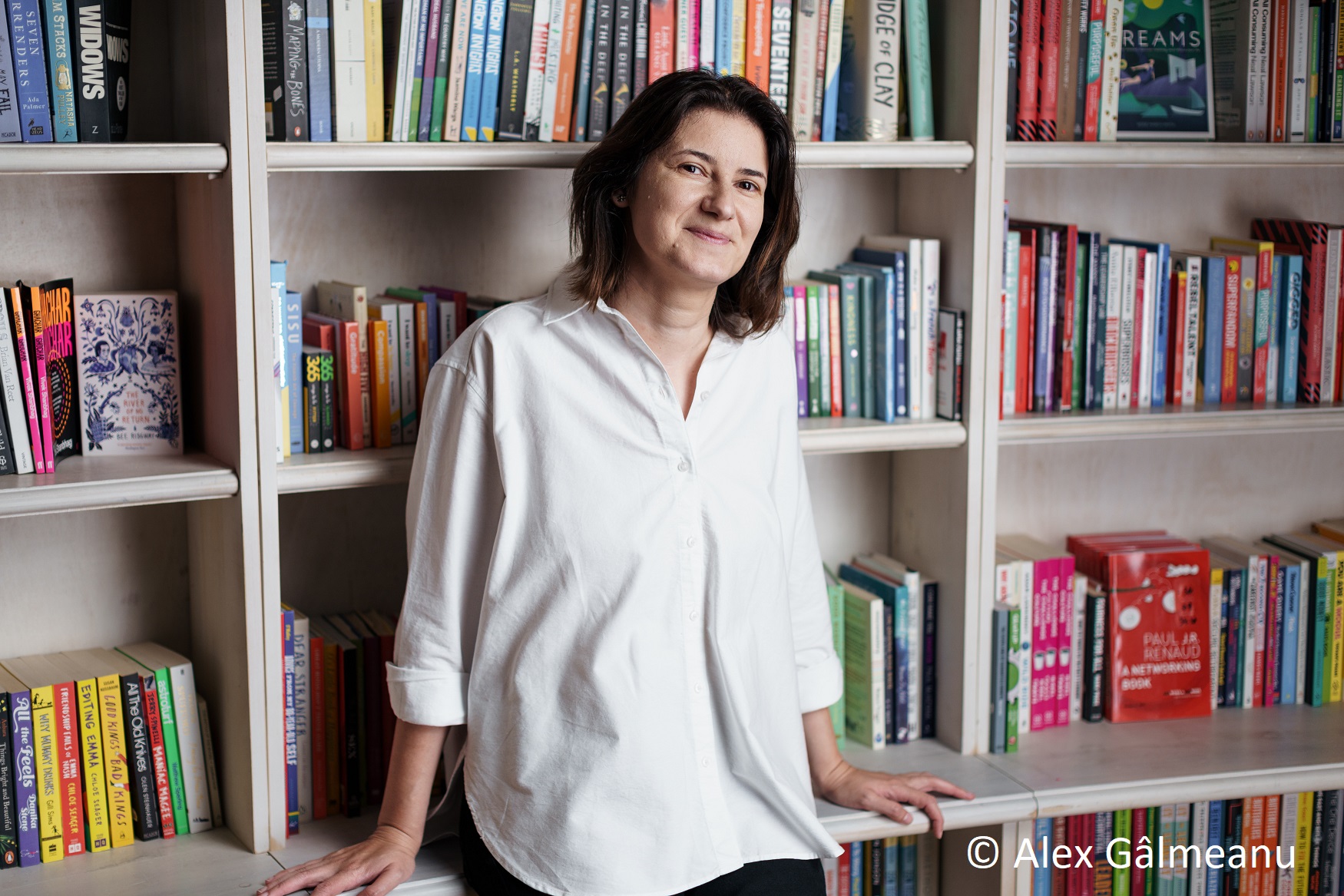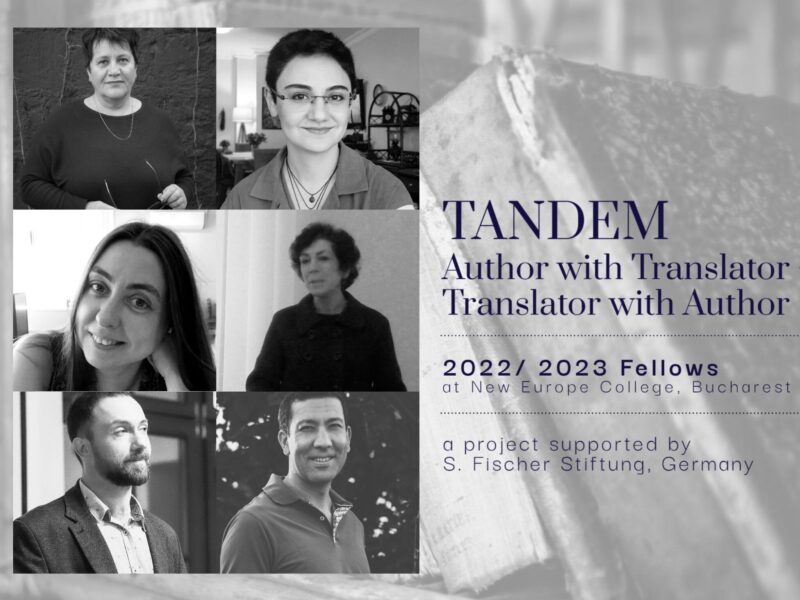Ana Niculescu is Communication and Public Relations Manager at Cărtureşti. She has been part of the Cărtureşti team since 2008, and since 2014 she has been coordinating the way in which the Cărtureşti brand has been interacting with partners and clients. She loves plant infusions with lemongrass, rosehip peels, wild strawberry leaves, mulberry and basil leaves. She reads non-fiction in the morning and poetry or novels in the evening.
For almost 8 years you have been the Communication and Public Relations Manager at Cărtureşti, after being the Events and Public relations Coordinator for more than 5 years. What does a workday look like for you, and how is it different to your past activity, before 2014?
My workday is as filled with the unpredictable as ever, but since the pandemic, most of it happens at home, sometimes in pyjamas and it lacks the physical points that marked the 8 hours spent at the office - lunch with my colleagues in the Verona Garden and the stroll among the bookshop shelves I did when my eyes were tired from the computer screen, or I needed some inspiration. There are always new things and proposals – a call to plan a launch, online this time, a partnership for a project that requires promotion or hosting, a chat bubble to discuss a change in the live session for that night on the Cărtureşti Facebook page, an interview request from a television channel, a Whatsapp message from a student who wants to film a few shots in Carusel store for his graduation movie. And it also depends on the day. On Tuesdays we have a work meeting with the department colleagues where we discuss all the projects of the week, on Wednesdays we have a meeting with the colleagues from other departments, on Fridays it’s brainstorming for some campaign or other.
If we look at the big picture, the activity of a communications employee has moved online more and more since 2014. Classical cultural press no longer exists, with a few exceptions. And since the pandemic, events have become lives on different social media platforms. Another major change is the leap Cărtureşti has made in the last few years, expanding to different cities physically, in 2019 we opened no less than 12 locations. And at a micro level, let’s say my focus lies more on what happens inside the team, I try to understand each team member, offer my help and support to enable them to be as creative and inspired as possible.
You must have planned hundreds of events, small or large scale, over the past 13 years at Cărtureşti. Is there one that is special to you?
Cărtureşti hosts over 500 events a year, from book launches and readings to debates, conferences, children’s workshops, exhibitions, small concerts. Each of which is loaded with a certain author or team’s emotions, who launch their book or project into the world. It’s a big day for each of them, and it’s impossible not to be connected to that feeling. And so, I don’t have one event I consider special, but rather keep flashbacks in the back of my mind: the joy of meeting Ioan S. Pop in a chilly January evening, when there were only 2 or 3 people at the event, the hum of one hundred voices reading out poetry at the same time and after the pages filled with lyrics flying in the empty centre of Carusel, when we organized a flash mob with ARCEN for the International Book Day; the ladies at the Botanical Garden, who loaned us some palm trees for the ‘book spa’ we organized in the Verona Teahouse, who came from Cotroceni to care for the plants on a daily basis; the blue eyes of Mihail Siskin and the fact that our samovar broke down during his launch, another event where the books were sold out and we had to run to our colleagues at Humanitas to bring a few more for the readers who wanted an autographed copy; the attic filled with Romanian designers and their peculiar projects at the debut of project ROD; the smiling faces on Arthur Verona street when Street Delivery takes place, I’ve never seen so many inhabitants of Bucharest smiling at the same time; John Green shedding tears of emotion after hundreds of readers gathered on Zoom to meet him at the FestivalYA. And I could go on with the list for a thousand and one nights.
Pandemic or no pandemic, attracting the public in bookshops seems to be a continuous challenge. One which you face with hypercreativity and the guts to implement new ideas that seem jokes at first. For example, the book booth at Obor Market, when you opened Cărtureşti Veranda - which blew me away (not necessarily because of a locational empathy, since it is a few steps away from home). Are this type of events and the directional lines of the organisation, acquisition, communication strategy generated and coordinated from the centre, or does each individual bookshop have its autonomy and liberty to develop as it pleases?
There is a centre, but it’s more a symbolic one – the values of Cărtureşti, the things that juniors learn at the School of Booksellers (Școala Librarilor) from their seniors, their preoccupation with the readers, the detailed curating of the products of the partnerships. And also ideas that can arrive from anywhere. Sometimes as a joke, as you put it… other times from the audacity of believing that it is possible to do things that at first seem crazy or a bit odd. A pop-up Cărtureşti in Oradea, 10 years ago, began with a Facebook message written by 2 high-school students who longed for a Cărtureşti Bookshop in their city. Back then they only received an ephemeral bookshop that lasted a day. Another bookshop, the one in Buzău, which we hope will stand the test of time, was opened thanks to a petition created by a reader. A poetry tasting organised at the suggestion of Genevieve Fieraru, bookseller at Verona, who carried a tray of shots made from pieces of paper which had lyrics written down on them. Flighty fortunes (Răvașe nărăvașe) were born out of the conversations from the Communications office. A silent book party organised in collaboration with the producers of the Fata/Verso podcast, where the guests wore headphones and each listened to their favourite podcast episode.
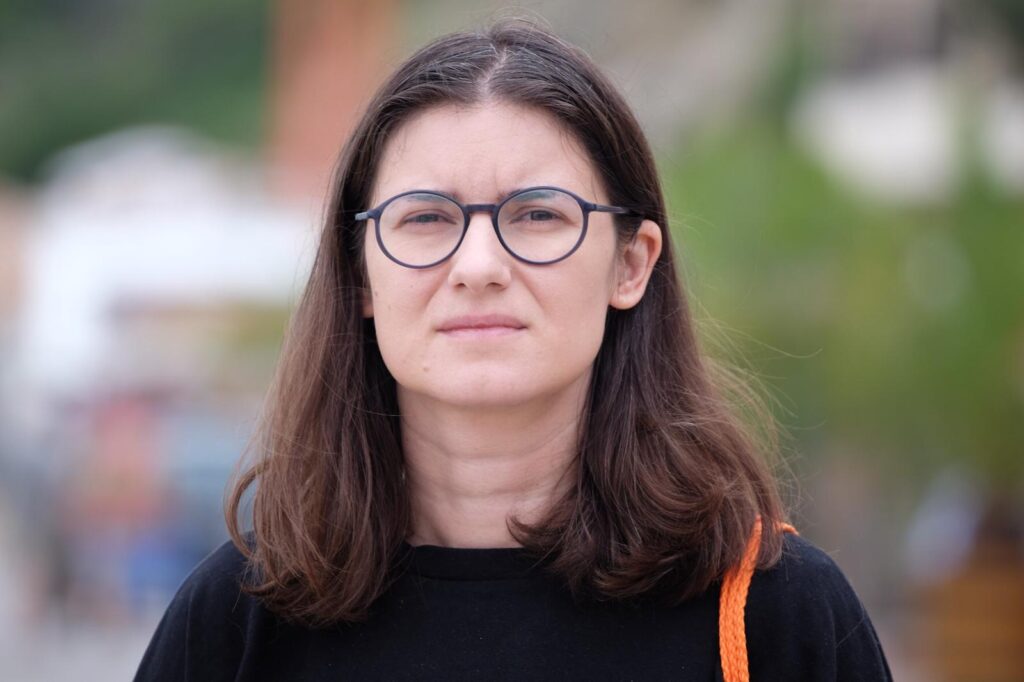
What is the conversion rate of these marketing and communication tricks? How many of them manage to have a real impact on the activity of the bookshop and how?
I have no idea what the conversion rate could be. Since we do not measure them in this manner. Sometimes what matters is that we had a good time, and behold, someone like you that remembered the Books at Obor thing. Someone else who remembers a book that had an impact on them or the wrapping paper with personalized illustrations made for us by Georgiana Chitac, or the way the light hits between the plants from the interior garden at Modul. All these customers have shown us they are loyal when the bookshops were closed for a few months, taking into account the preceding year during which we opened 12 new bookshops, hence some huge investments. These readers ordered books like never before, asked their friends to order from our website, and when we re-opened, they came back in large numbers in the bookstores. They kept us afloat, without their support, and that of the publishers and partners, we would probably not be having this conversation right now. And maybe the impact you spoke about is visible on Christmas, for example, when acquaintances that have not seen each other for 2 years because of the pandemic reunite in Cărtureşti, each with their arms packed with books, and start to chat in the middle of the bookshop, and during their conversation, another common friend joins the chat with their 2 kids by their side. And this is so natural and such a celebration, to buy books for your loved ones from here.
In an interview you were talking about the financial efforts that were the base of creating Cărtureşti Carusel and, more recently, of the Cărtureşti Victory Square (Piața Victoriei) in Timișoara. Aside from investments, floorplans and interior design, I imagine that launching a new bookshop also needs a communications plan. How and at which point do you get involved in the project of a new bookstore?
The communications plan starts when we receive the drafts with layout proposals from the architects. Almost every bookstore has a unique design, elements that are exclusive to that location and that have a story behind them, which we try to detail in our Facebook posts, Instagram pictures, press releases. Next comes meeting the new colleagues who will host the location, talks about what their city is like and how they would like the bookstore to look like. Comprehensive discussions with some colleague that has a passion for social media, who will be in charge of the local Facebook or Instagram page, if you can imagine we have 29 local Facebook pages, 26 Instagram accounts and, the latest, a fast-growing TikTok account. Special concept bookstores like Cărtureşti Operei from Timișoara are launched with events where local personalities, music bands, performers are invited. For the launch poster we collaborate with an illustrator from each town, for example in Timișoara we collaborated with Livia Coloji. Also, for the bookshops where we do not plan a launch event, we prepare small surprises for the readers: gifts at the first visit, like teas or books or a special bookmark, a magnet, like the one which said ‘Books are read in this house’.
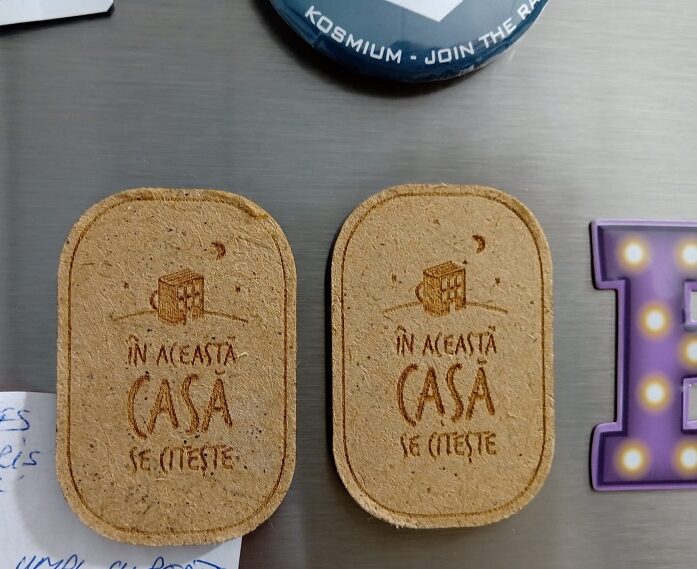
Cărtureşti bookstores have reached many cities. Which was the biggest discrepancy between expectations and results, whether it was exceeding or below expectations?
My visit to Chișinău was an extremely pleasant surprise, after opening our first bookstore there in 2019. I discovered there were many people that knew the brand Cărtureşti, that visited our shops when coming to Romania and made purchases as well, that were delighted at the news that they would be able to find the best and most recent editorials from over the Prut in their hometown. And so, on the first of December, last year, came the opening day of our second Chișinău bookstore, one of the most beautiful of the entire chain of stores, within the History Museum. For this campaign I worked with an extremely creative and dynamic local agency – Piko.
The projects that require better fortune tellers are the experimental ones, being cooked up in the laboratory, that take a step sideways from the normal formula, let’s say. For example, the Fandombookstore, a store that specialises in comics and manga, that was launched maybe a bit too early on the Romanian market and converted to Cărtureşti & Friends with the help of the talented bookseller Vlad Niculescu.
In the same interview you were saying that each Cărtureşti bookstore has its own profile and community. For the ‘self-standing’ (it’s the best term I could find) this is obvious, whereas for the bookstore inside malls, things become more complex. At least at first glance, they seem harder to tell apart. How do you offer an individual voice to the latter and how is their dynamic within the Cărtureşti network?
Unfortunately, most cities in Romania, including Bucharest, do not have pedestrian commercial arteries. Opening a new Carusel would involve a colossal financial effort, impossible to achieve without the help of local and central authorities. But this is a different discussion. Whether we like it or not malls are the commercial nodes of the cities. And those that frequent them, spending an entire day of the weekend there, have various interests and needs. They are searching for a good book to read, or a present or a schoolbook. This is when it is vital to be reachable, close to home. The person then becomes attached to the location, since it is his neighbourhood bookshop, they become familiar with the booksellers, maybe they start to chat, and they might recommend titles to them. The booksellers start to slowly get to know the readers, they remember their preferences, they pack the shelves with books they want, or search for, or don’t even know they are searching for yet. Sometimes the customers just need a break from all the mall shopping, and they enter the bookstore where it is suddenly quieter, less fuss. The music is pleasant, one’s footsteps are softened on the rug, they discover a title, sit back on the armchairs and start to browse the pages. In the end, things are not very different from a street bookstore.
Who represents the competition of Cărtureşti bookstores? Other offline booksellers, publisher’s own websites?
Social media, the abundance of information, the cell phone sending us notifications every minute? I think these are the elements that drive us to read less if we are not careful and do not have a balanced relationship with them. In such a small and fragile book market like the one in Romania, each bookstore that closes its doors and each publishing house that disappears is a huge loss and it threatens the entire ecosystem. Any player has a decisive role in expanding the market, in facilitating the access to books, as long as they do so in a manner that does not harm the entire industry through aggressive pricing policies, discounts on books that were launched no more than a week before, or the lack of a healthy long-term vision.
And maybe in the following years, I would pay attention to the self publishingarea, which is starting to blow up internationally, and to the ways a bookstore can collaborate with this sector.
There is this battle being held for a few years between independent bookstores and the big chains, sometimes low-key, other times very vocal, particularly in the American area (Amazon being the main target, of course). In your opinion, can we talk about such a differentiation in the Romanian market? Is Cărtureşti a threat to Romanian ‘indies’?
We are looking at 2 different business models. Amazon is an online giant that hit hard in the offline bookstore industry. Today, Cărtureşti is the biggest chain of offline bookstores in Romania, which means we have a responsibility to ourselves and other industry players, which we take very seriously. Our wish is to bring a contribution to enhance the professionalism of the industry, we constantly invest in logistics, processes, which is not a known fact about us, and we always try to help where we find open doors. For example, we have a business relationship with a small Children’s bookstore in Cotroceni, which we really like. I am speaking about Asteroidul B612, of course. Another example is a bookstore in Maramures, Cartemma. And the list goes on, it is pretty long.
Since you mentioned America, when I visited Seattle two years ago, in April, around the time of the International Book Day, all the independent bookstores had common launch schedules, autograph sessions, reading sessions, workshops for kids. I would love for this to happen here when the restrictions are gone.
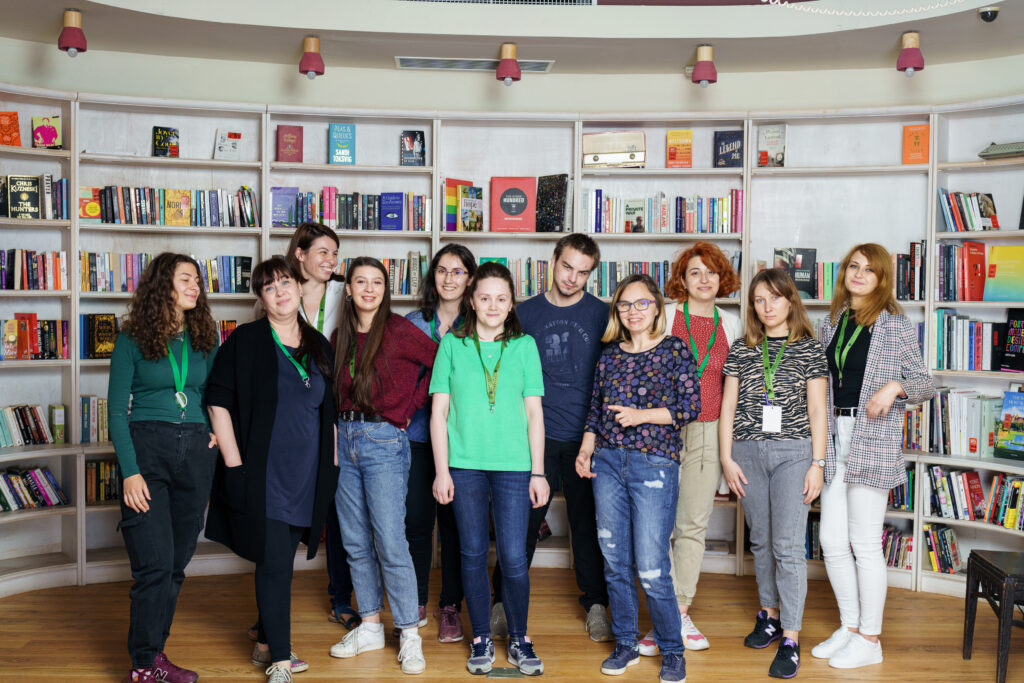
I read somewhere that the new booksellers are being offered some training sessions, learning from their senior colleagues. That is, after they pass the interview, which I know for a fact is very serious, and also involves a general knowledge test. What are your expectations from collaborators and how do you motivate them to reach these expectations?
If the physical locations are the body, the bookstore attendants are the heart of the brand. And it always beats for books, music, movies, and especially for the readers who step through our doorway. The most important aspect is that the booksellers are very different between them. We are looking for colleagues that make us whole, not the type that just agrees to any proposal from our end. We are creating teams that grow through the effervescence of placing different minds and mindsets together. Some are chatty and always ready to start a conversation with customers, while others are more reserved and only talk about their passion for graphic novels or noirfilm during their cigarette breaks. We share what we’ve learned in the past 20 years of existence and we try to spread this bug among them, the passion for bookselling at the internal school we organize. And after that we offer them as much autonomy as possible.
The question we always ask ourselves is how we can make the job here at Cărtureşti as useful as possible for their future careers. Many of them are students, on their first job, and they will leave this place towards other horizons, and so it is important for us what they leave with. Those who stay and develop their bookstore attendant career, but also those who write only a short story next to us draw their energy and motivation from the daily life in the bookstore. The smile on a reader’s face when you hand them a book they were searching for, but had not managed to find, the satisfaction of recommending a book tailored to one’s tastes, the joy of discovering new titles, freshly printed, the extremely interesting things you can find out from a customer. These are the reasons one wants to become a bookstore attendant for.
The physical bookstores are accompanied by the Cărtureşti.ro website, ‘a full-blown bookstore, containing all requirements’, as it says on the website. Does the customer profile differ from the physical ones? How did you manage to switch from the sensory experience that is a visit to a bookstore, to the fast-buy behaviour we see online?
I don’t see it as a switch, but a blend of the two forms, to discover and to buy books. Just like our lives are now, a pendulum between the digital and physical worlds. There are fast-buy customers in bookstores, that maybe did they research online in advance and bring a list of books, knowing exactly what they can find on the shelves. Maybe on one visit they will browse one or two books and leave without purchasing anything, and on a rainy weekend, when they’re not in the mood to go out of town, they will access the online shop and order the same books. In my opinion, it’s important to take the best out of both worlds and to always be close to the readers, no matter what that means.
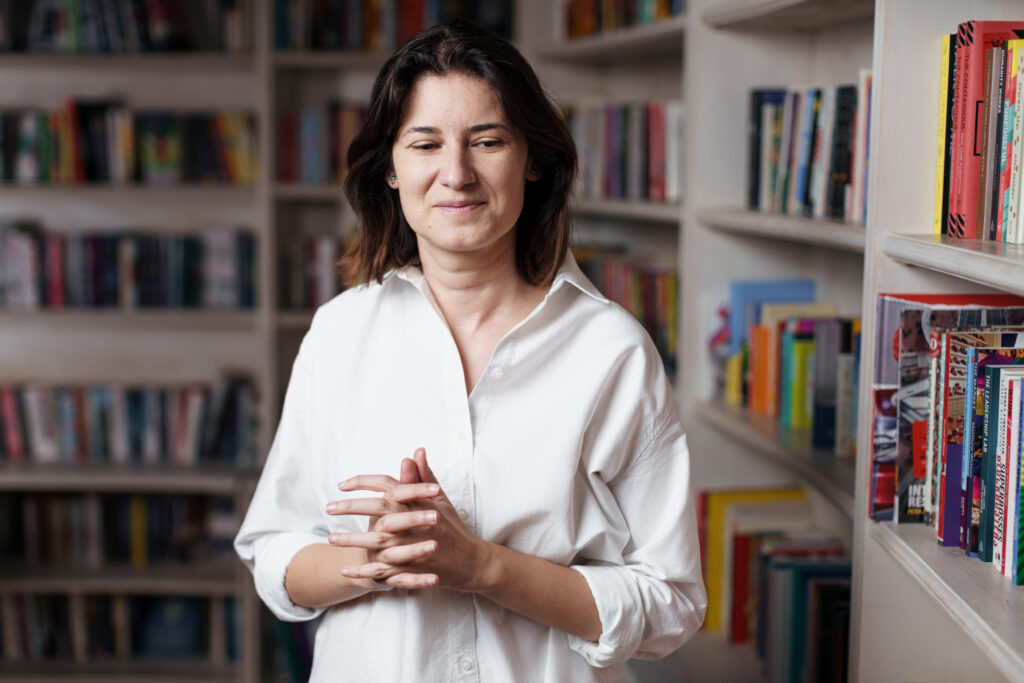
It is already a known fact that the Cărtureşti bookstores are not just for selling books. They are not just places that commercialize books, music, tea and other art products, but full-blown cultural experiences. How is this maintained, and how can you avoid passing the fine line between ‘multi-sensorial experience’ and ‘all in one’?
We like to state that diversity is our secret ingredient. We fill the shelves with products that others would not know how to combine. We’re not afraid to bring too many different products among books. Nonetheless we are talking about a well-chosen diversity through heated debates inside the team, pros and cons about a certain product, a certain event that may take place inside the bookstore. When choosing, we always rely on the knowledge obtained by our colleagues that have a passion for a certain literary genre, for yoga, or for interior design. We go to specialty fairs, we consult catalogues, we listen to customer feedback . It’s a continuous process of searching, curating, experimenting, trial and error, refinement.
Last year, Cărtureşti Verona was designated Bookstore of the Year at the London Book Fair International Excellence Awards. Among the reasons the jury mentioned there was your online activity and the Scholarships for literary work offered to Romanian writers. What do you think were the decisive criteria this time, compared to 2018, when Cărtureşti Carusel made the short list? And what was the impact of this award for you on the Romanian Book market?
In Against Amazon and Other Essays , the Spanish critic Jorge Carrión wrote that he considered this award one of the most relevant in the industry because it takes into account the community impact a bookstore can have. The Literary Creation Scholarships we offered to Romanian writers were very well received, by the readers, but also by the writers that did not receive almost any support from the authorities in the past years, in which the independent cultural sector was severely affected by the pandemic restrictions. We hope more such programs will appear in the future.
Also, there was a huge effort to keep up the relationship with our readers, to not lose touch when everything was closed down in the city. This inspired the very cool idea of an online festival dedicated to young adult literature, FestivalYA; events with therapists from the Institute for Study and Treatment of Trauma about mental health, conversations on social media with readers where bookstores would recommend books, selections of games, toys, volumes of children’s stories for parents that worked at home with their kids. I think all these mattered.
Recently, in a letter to Bucharest, Ioana Pârvulescu reminded us about the beauty that lies in the bookstores of the city. These bookshops appear in international top lists, tourist guides, news stories. I think this award brings a type of acknowledgement of all these special places, built around books and readers, who keep them alive.
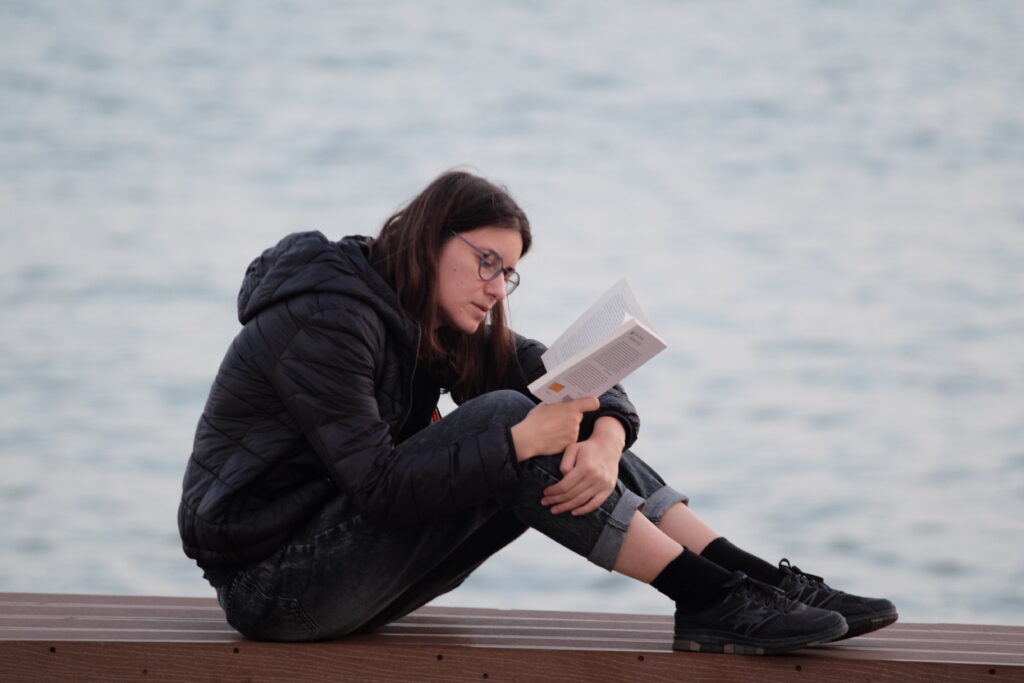
Until recently, we thought the pandemic would be the biggest challenge of our lives. Meanwhile, a thousand kilometres away from Bucharest, a war is being fought, the type that we could not imagine possible in the 21st Century. How is the war in Ukraine affecting the life of books and of the people around them?
Two things immediately popped into my head when I read your question. The first one – an article about a bookstore employee from Lviv, Romana Iaremyn, 27 years old, who saves books from Putin’s bombs. In the basement of the bookshop, used as an air raid shelter and a reading space for children, she protects countless volumes brought from Kharkiv, a city that is partially surrounded by the Russian army, and bombed on a daily basis. Of course, the story is already impressive, were this the end of it. But, by far the most touching detail of this article is the fact that these titles do not remain closed off in the white boxes used for transport. The mothers and children escaping the path of the war and who temporarily seek shelter in Lviv, borrow these books to calm down and distract the little ones from the terrible reality. And this is not exclusively in Lviv. It also happens in Bucharest, Cluj, Iași and Chișinău. The Ukrainians came to bookshops just a few days after passing the border, leaving all their belongings behind, to search for books for their children. To read them stories before bedtime. In a foreign bed, in a foreign country, stories are their familiar space, their home. In this context, I want to mention Do Little Reading – Cluj Books Hub, that immediately understood this need of the parents and children alike, and organized some mini libraries with books in the Ukrainian language for the little ones in different spaces in Cluj. We also host such a library corner in the Cluj Bookstore and there are more on the way in Bucharest and Brașov. This initiative of Do Little Reading is just one of the numerous examples of extraordinary things the Romanian civil society has done to help our neighbours.
The second is a poem by Moni Stănilă, written during the Residence at Vila Golescu, from Câmpulung Muscel, in the framework of the Cărtureşti Literary Creation Scholarships. The poet came from Chișinău, on the 1st of March, a few days after the beginning of this absurd and incomprehensible war, as you put it. In Chișinău she could hear the thunder of bombs while destroying cities and taking lives in Ukraine, and she came to the tranquillity of Golescu in order to be able to hear her thoughts, which sound like this:
When the great Ukrainian cities are ploughed away by bombs
there is no turning back. The world as we know it
has disappeared with every murdered child. With every building
torn to the ground.
This is probably how incurable diseases strike the lives of the young.
The spoken diagnosis changes everything. Death
Is no longer an odourless presence. It receives body inside a young body.
I wish to never learn that feeling
That envelops each cell when the doctor says:
No turning back.
The world I grew up in was shattered even if
I can see clearly that the ash tree grows as slow as ever, and the snowdrops
Refuse to grow below zero degrees. Acceptance,
Placidness, moving on. Survival.
At least at old age
There won’t be a soul to tell: it was like this
Inside my world, times were like this
When I used to love. But the joy remains
That somewhere in the world I see from my balcony,
On the other side of the globe, there is a young soccer fan
Who doesn’t know where Ukraine lies on the map. And that child
Saves all day
Images of Mbappe in his phone gallery.
If I favoured Ash Barty instead of Simona Halep
I could move to Australia, to run
Through the desert among kangaroos,
To scream like a child: I am Nadia, I am Nadia,
And Putin’s Russia would fictionalize inside my brain
After each desert lap.
What is your perfect combo in terms of books, tea, music and fancy?
The perfect combo is not a combo ☺. Since I can’t escape multitasking at work, when I have time to myself, I prefer to do things one at a time, one by one. In the mornings I begin reading the second my eyes are open. Non-fiction. I have started to read The Lonely Century: Coming Together in a World that's Pulling Apart by Noreena Hertz. The evenings are for poetry or novels. These days I am playing around with The Book of Plants and Animals by Simona Popescu and I am admiring the mastery of Jaume Cabré in Confiteor. I prefer plant infusions to tea. And so, I like to sink in hot water some apple slices, orange peel, mint, lemongrass, rosehip peels, wild strawberry leaves, blackberry leaves, basil, lime oil from an envelope that has Ayran Mint written on it (beware of product placement). In terms of music, I just listened to the soundtrack of a miniseries I really enjoyed on Netflix, The Maid. The fancy part is linden flavoured ice cream from Friddi. [Translated into English by Amalia Nicolăiță.]

